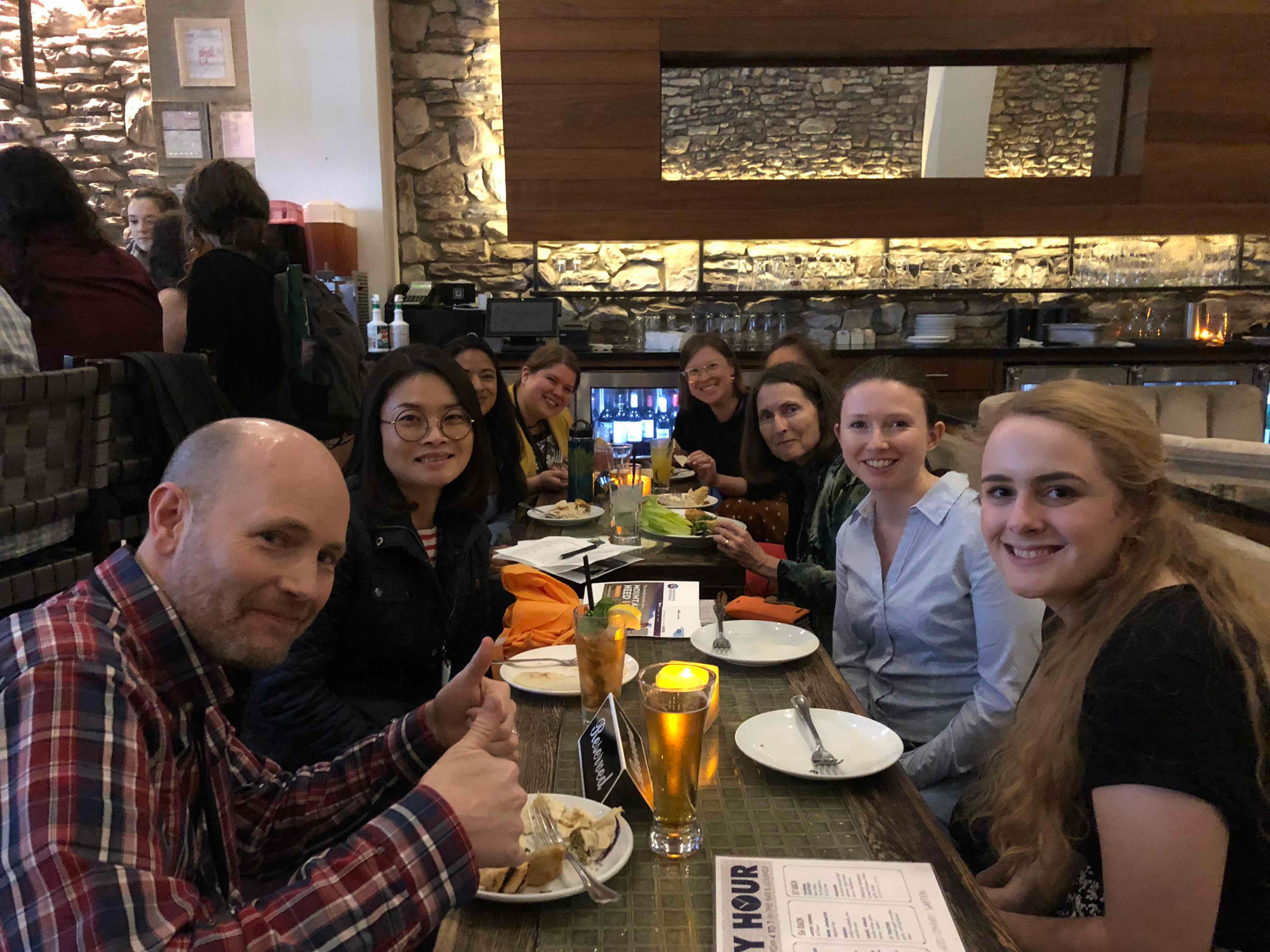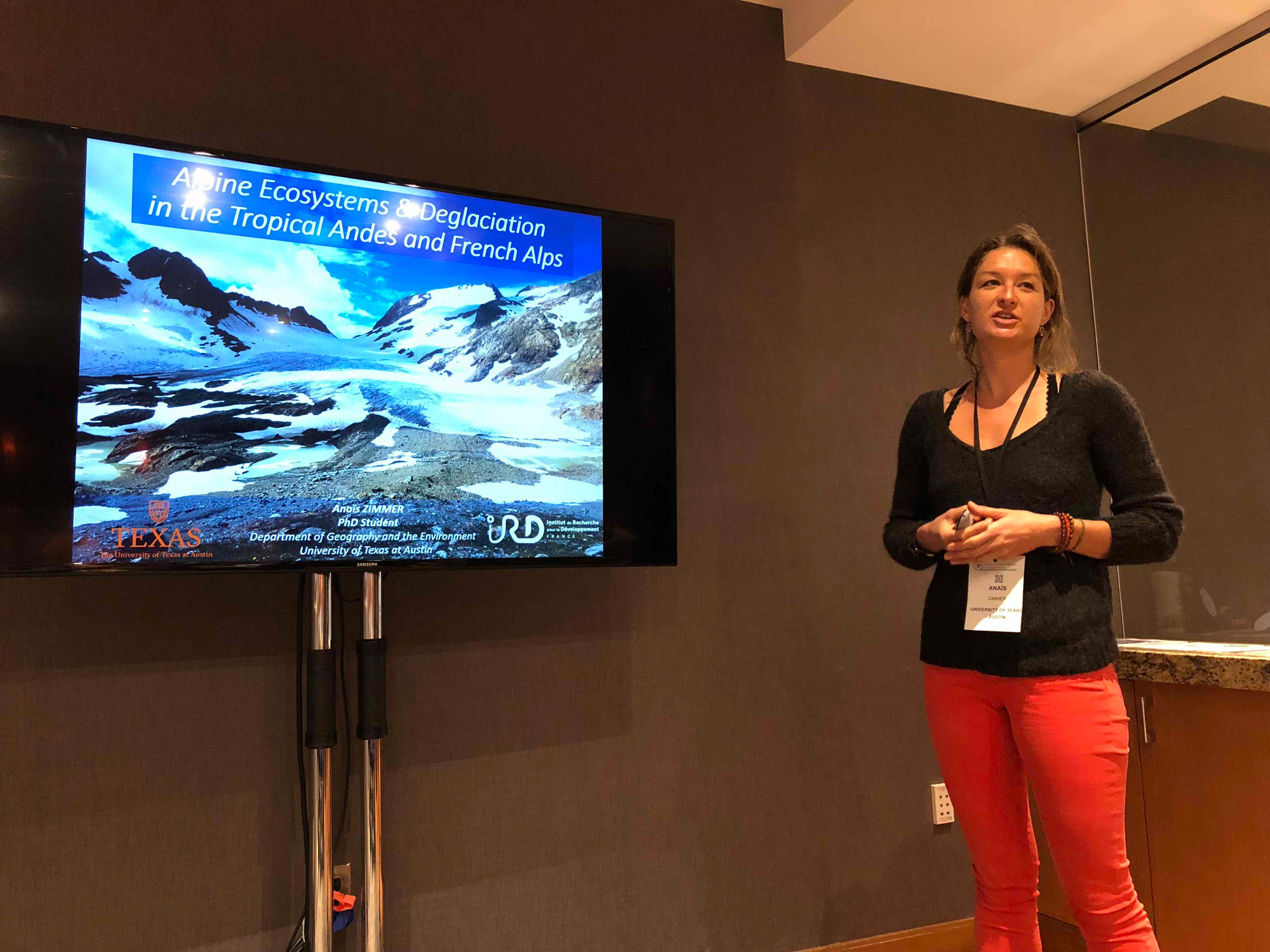By Cara Steger
— Our second annual Mountain Day took place on April 5, 2019 at the American Association of Geographer’s Annual Meeting. We had a full day of presentations and small group discussions around “Mountain Futures” that stretched across countries, continents, and academic disciplines, and we continued the conversation over tasty snacks and beverages at a nearby Lebanese tavern well into the evening. “I found my people!”, one presenter remarked upon seeing the diversity of mountain landscapes and cultures represented in our sessions – and we here at Mountain Sentinels agree!
The early morning session centered around ethnographic approaches to understanding change in mountain systems. Four case studies drew our attention to the social and cultural components of global change in some of the most iconic mountain systems in the world. Kara Chipiwalt described the heavy emotional burden of farmers experiencing glacial retreat in the Peruvian Andes, and how those causes and consequences are perceived differently across genders. Anna Bebbington then told us how smallholder farming in Peru is more than just a livelihood choice, it is part of a cultural identity that is rapidly changing as more and more youth abandon rural mountain landscapes in favor of cities. Laura Caplins moved us to the other side of the world to show how international markets for caterpillar fungus were changing the ways in which local communities in the Indian Himalaya resist outside conservation efforts – and why that is good news for issues of equality and access at a local scale. Finally, Irena Mrak described the many environmental and social risks associated with mountain tourism in the Pakistani Karakorum, and how tourists, local communities, and government can work together to mitigate some of these rapidly growing risks. These case studies were followed by a presentation from Mountain Sentinels co-PI Catherine Tucker, who very eloquently argued for increased use of ethnographic methods to improve collaborative research efforts in mountain systems by increasing trust and respect among participants.
The second morning session encompassed a variety of presentations primarily related to biophysical or natural science approaches to mountain futures. Kramer Gillin kicked things off by sharing his compelling insights that mountain pastoralists are likely to benefit from more secure land tenure arrangements rather than increasingly flexible ones, as seasonal variability and spatial heterogeneity require livestock to move between a more restricted range of pastures compared to lowland systems. Anais Zimmer brought us back to glacial retreat in the Andes to describe how plant succession remains slow in formerly glaciated regions despite the accelerated rate of warming, and what her dissertation research hopes to learn about the impacts of grazing in these areas. Sisimac Duchicela examined the impacts of warming temperatures and increased nutrient deposition on the growth and species composition of paramo ecosystems in Ecuador. Courtney Cooper revealed gaps in how adaptation and mitigation to climate change are addressed in research about the Colombia River basin, highlighting the need for improved engagement between social and biophysical sciences to address these issues. Finally, Anne Nolin demonstrated the value of using integrated simulation models to explore changes in the food-water-energy nexus in the Willamette River basin.
After lunch, we organized our third set of talks around trends in transdisciplinary research and practice. Robin Reid took us on a journey through time and across disciplines to try to piece together lessons in transdisciplinarity that can help us advance research and practice relating to environmental sustainability. Julia Klein described how collaborative approaches are critical to understanding and preparing for mountain futures, discussing preliminary results from a survey that indicate improved communication to non-academic audiences and better evaluation of learning outcomes are needed in collaborative approaches. Cara Steger used a literature review of social-ecological models in mountain systems to contribute to debates regarding the level of complexity or realism needed for models to improve decision making and learning in real-world applications. Finally, Erin Gleeson presented some case studies of successful ecosystem-based adaptation in Nepal and Peru that emerged through transdisciplinary processes.
In our panel session, we broke into small groups to discuss what innovations and strategies we think are most needed for catalyzing transitions to sustainability in mountain systems. Multiple small groups focused on the importance of valuing place-based research that is highly sensitive to socio-cultural context, and training students and practitioners to conduct this kind of work. We also commiserated on the need to convince donors and funding agencies to enable transdisciplinary projects to begin without a clear objective in mind, so that local people could contribute more to the design of the research and thus improve its credibility and utility for addressing local problems. We touched on the importance of clarifying value chains so that profits from mountain commodities flow more directly back to mountain communities. Finally, we discussed the need for a data sharing platform that would be flexible enough to use in different local contexts, but standardized to allow us to make improved generalizations across mountain systems.
In short, mountain futures are incredibly diverse! While there are critical threats and uncertainties in mountain futures, there are also many bright spots of innovation and adaptation that were highlighted by our amazing presenters. Our Mountain Sentinels team left feeling empowered and ready to embrace another year of collaborative research and practice in mountains, and we can’t wait to share what we learn next year at AAG in Denver, Colorado!

Clayton Whitesides (right) from Coastal Carolina University and the head of the Mountain Geography Specialty Group at AAG speaks with a colleague at the Mountain Sentinels social event at AAG following a full day focused on mountains.

Lots of happy colleagues – including Bryan Mark from Ohio State University and Catherine Tucker from University of Florida – enjoying the Mountain Sentinels social event following a full day on mountains.

